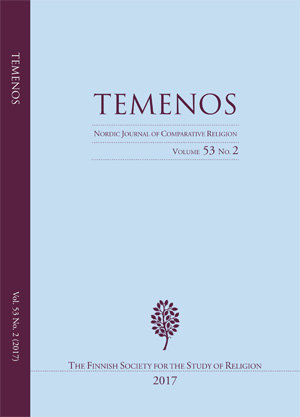Dress in Choral Evensongs in the Dutch Context – Appropriation and Transformation of Religiosity in the Netherlands
DOI:
https://doi.org/10.33356/temenos.54198Keywords:
Religiosity, Choral evensong, Dress, Transformation, TranscendencyAbstract
This article studies the appropriation of Anglican choral evensong, and more specifically, dress at choral evensong, in the Netherlands outside the context of the Anglican Church to gain more insight into religiosity in the Netherlands. The authors explore the dress worn at choral evensong in the Netherlands and the meanings participants attribute to it. The concepts of denotational and connotational meanings are used as an analytical tool.
In analysing their interviews, the authors came across three categories of meaning and function participants attribute to dress at choral evensong. The first category was the reference to ‘England as a model’. By wearing Anglican dress, choirs indicate they belong to the high-quality sound group of English cathedral choirs. At the same time, by changing the Anglican ‘dress code’, choirs emphasise their unicity and individuality, independent of church traditions. The second category was the marking of identity: choirs copy the dress from the English tradition, but add some elements to mark their own identity. Besides this marking of identity, aspects of unicity, uniformity, group identity, and gender-marking also play a part. The third category was metamorphosis and transcendence. Choir members refer to unarticulated transcendental experiences by wearing ritual liturgical dress. On the one hand the authors noted a ‘cathedralisation’ or ‘ceremonialisation’ of the singers’ dress, and on the other a de-institutionalisation, for example, in the dress of the minister, if present. The article’s main conclusion is that the fieldwork data reveal that dress at choral evensong in the Netherlands points to changing religiosity at two different levels. First, the authors observe a transformation in the way religion is expressed or ritualised in Reformed Protestant churches in the Netherlands. The popularity of evensong suggests a longing for other forms of worship, with a focus on ceremonies and Anglican-like vesture for the singers. Second, they observe a mix of concert practices and Anglican-like rituals, which the interviewees in our research refer to as a new form of religiosity. In both practices the traditional dress of the Anglican Church is used, whether copied exactly or adapted.
A new phenomenon may be observed: choirs wear Anglican-like vesture decoupled from the Anglican Church as they are longing for transcendental experiences which they find in the musical-ritual form and high musical quality of choral evensong.
Downloads
Published
How to Cite
Issue
Section
License
Copyright (c) 2017 Temenos - Nordic Journal of Comparative Religion

This work is licensed under a Creative Commons Attribution-NonCommercial-NoDerivatives 3.0 Unported License.
Author's Guarantee
- The Author acknowledges that the Work will be publicly accessible on the Internet and that such access will be free of charge for the readers.
- The Author guarantees that the Work is her/his original work that has not been published before and cannot be construed as copying or plagiarism. Furthermore, the Author confirms that the Work contains no statement that is unlawful, defamatory or abusive or in any way infringes the rights of others.
- The Author confirms that she/he has secured all written permissions needed for the reproduction in the Publication of any material created by a third party.
User Rights
Under the CC BY 4.0 license, the Author/s and users are free to:
- Share — copy and redistribute the material in any medium or format,
- Adapt — remix, transform, and build upon the material for any purpose, even commercially,
- However, the Work must be attributed to the original Author and source of publication.
The license of the published metadata is Creative Commons CCO 1.0 Universal (CC0 1.0)
Author Rights
The Authors maintain the right to:
- copyright, and other proprietary rights relating to the Work,
- the right to use the substance of the Work in future own works,
- the right to self-archiving/parallel publishing (publisher's PDF allowed).
Rights of Publisher
- The Publisher reserves the right to make such editorial changes as may be necessary to make the Work suitable for publication in the publication, e.g. style of punctuation, spelling, headings and the like.
- The Publisher will publish the Work if the editorial process is successfully completed and reserves the right not to proceed with publication for whatever reason.
- The publication entitles the author to no royalties or other fees. This agreement will be governed by the laws of Finland.






